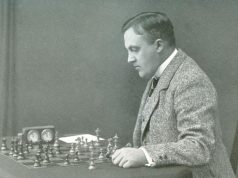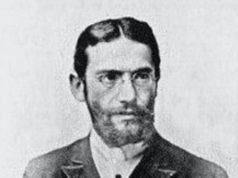As Arsene Wenger signed off from his Arsenal duty after 22-years of eventful career, he became the longest-serving football manager in any of the four professional divisions in English football. During Wenger’s tenure, Arsenal won three Premier League titles and seven FA Cups but also had a stretch of nine straight seasons without a trophy. Still he continued with the Gunners and bound himself with Arsenal’s identity. It is difficult to imagine the touchline without Wenger’s composure and integrity.
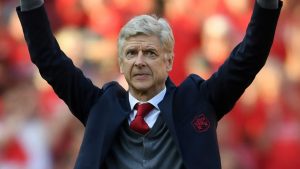
“It’s a bit strange for me. But I’m slowly understanding that it finishes, so I’m adapting now. Thank you for having me such a long time. Above all, like you, I am an Arsenal fan. It is a way of life, it is caring about the beautiful game and the values to cherish.”” Wenger commented in his last pre-match press conference.
Arsene Wenger remained at the helm of Arsenal for 22 years which moved him ahead of Sir Alex Ferguson. For years, Ferguson had been the longest-serving manager in Premier League history, starting in August 1992 with Manchester United and spending 21 years in the hot-seat. But, this May, the Frenchman snatched the record from the Scot before his final exit from the Islington football club.

Wenger’s exit had drawn much attention and why not? He has been instrumental in delivering the best for Arsenal, in developing youth programmes that helped to change the English football, in visioning a new set of rules towards training, diet and recruitment and being an ambassador of insightful, articulate and idealistic character in world football.
But exactly 13 years before, there was another noted exit, without much hullabaloo and that too by a football manager who happened to be a compatriot of Arsene Wenger. Guy Roax, as per UEFA, is the longest-serving manager of a single football team with a remarkable 44 years under his belt.
In central France, about 165 kilometres southeast of Paris, lies the small city of Auxerre. Guy Roux was born in Colmar in the north-east of France, but his family moved closer to Auxerre when his father was held prisoner during the Second World War. Roux developed his passion for football and at 16 he made his first-team debut for Auxerre in the local Burgundy League. Thus, his association with the French side started that actually spanned 53 years, with 44 years as manager.
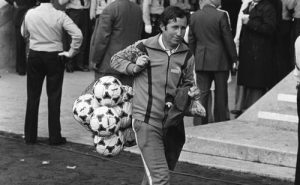
But playing for the club for some 6 nondescript years, Guy Roax realized that he is short of talent to play at the highest level. He soon understood that if he wanted to succeed in the sport, he definitely had to be in something else and it would have to be in coaching.
Roux sent off an application for the vacant head coach position at l’Association de la Jeunesse Auxerroise without having any notable coaching experience, only having learnt the ropes as an observer for a month at Crystal Palace. In his letter, he said he was prepared to ‘do whatever is needed for the club, even chop the wood’. Jean-Claude Hamel, then one of the directors of Auxerre, was also impressed by Roux’s demand of the lowest wage among all the applicants. Thus, at 22, Roux sealed the job of a player-manager at Auxerre.
As was promised by him in his application, Guy Roax soon proved himself to be much more for the club. He persuaded local farmers to donate their goats’ dung for Auxerre’s playing fields, had players’ wives make bibs for training and in the evenings would run the club’s switchboard himself.
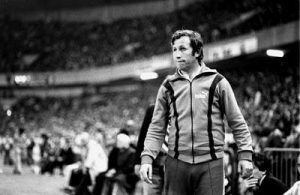
Back then, it was just a bunch of amateurs playing in the fifth tier of French football. After Roax’s entry, Auxerre began climbing up the ranks of French football throughout the 1960s. In 1970, the year Roax retired as a player, the club earned promotion to the third division and after four years Auxerre entered Ligue 2. In 1979, Roux’s team made it all the way to the Coupe de France final, a massive achievement for a second division side. Four time Ligue 1 champions Nantes needed extra time to beat them in the final. The club’s improvement was noted as in 1980 they won promotion to Ligue 1.
Roux instilled a professional attitude within the club that played a vital role in opening a new training centre to provide the players state-of-art facilities that was unimaginable in Auxerre at some point of time. The visionary knew that he had to build the club by investing heavily in the youth academy and thus played a masterstroke by rejecting the chance to sign French international striker Olivier Rouyer when the club was promoted to Ligue 1. Instead, he advised to invest on the club’s youth academy that later produced players like Eric Cantona, Basile Boli, Frédéric Darras, Pascal Vahirua, Raphaël Guerreiro, Stéphane Mazzolini and Djibril Cissé. Out-of form star players such as Enzo Scifo and Laurent Blanc put their career back on track through stints at the club.
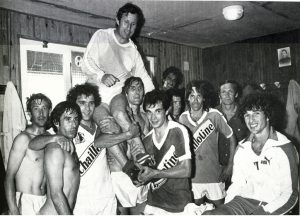
In the first few seasons in Ligue 1, Auxerre secured mid-table finishes under Guy Roax. But their greatest achievement came when in the 1983-84 season, Auxerre finished in third place and as a result qualified for the UEFA Cup. They had a poor first round exit that year but qualified again the next season and was successful in emerging victorious against AC Milan. In the 1992-93 UEFA cup season, Auxerre qualified for the quarter finals where they drew against star-studded Dutch club, Ajax. They were into the semifinals but had a heart-breaking penalty shoot our loss against Borussia Dortmund.
The 1995-96 season was the most successful season for Guy Roax and Auxerre. Fresh from winning Coupe de France, their first major tournament in 1994, Auxerre won the league, beating out French giants PSG and Monaco. Corentin Martins became the leading goal scorer who was ably supported by star center back Laurent Blanc. They also won the Cup for the second time in three years, defeating Nimes 2-1 in the final.
Auxerre could never reach the height they achieved in 1995. But in his 44-year career, Guy Roax won four Coupe de France trophies, one Ligue 1 championship and never got relegated from the league. In 2005, Roax resigned from the topmost position of the club and seven years after, in 2011, Auxerre dropped to Ligue 2 after a 32 year stay in the top division.
 Roax’s hard discipline was sometimes criticized as tyrannical. Not only players, but the backroom staffs and volunteers were pretty much scared of him. Yet, he was much loved. His famous statement goes like this, “To be a manager you need two things: to be an example; and to love. If one of your players shows up at nine in the morning, you need to be there at 8.30 and preferably not drunk. And you have to love your players. If you don’t love them, they’ll feel it and, believe me, you will too.’
Roax’s hard discipline was sometimes criticized as tyrannical. Not only players, but the backroom staffs and volunteers were pretty much scared of him. Yet, he was much loved. His famous statement goes like this, “To be a manager you need two things: to be an example; and to love. If one of your players shows up at nine in the morning, you need to be there at 8.30 and preferably not drunk. And you have to love your players. If you don’t love them, they’ll feel it and, believe me, you will too.’
 His decision to announce his resignation the day after the 2005 Coupe de France victory was widely interpreted as a calculated move. He received the bulk of attention at Auxerre’s victory parade rather than the players. But the man whose name was synonymous to Auxerre inevitably deserved this much attention. An employee for almost half of their history, Guy Roax is definitely Auxerre and Auxerre is Guy Roax.
His decision to announce his resignation the day after the 2005 Coupe de France victory was widely interpreted as a calculated move. He received the bulk of attention at Auxerre’s victory parade rather than the players. But the man whose name was synonymous to Auxerre inevitably deserved this much attention. An employee for almost half of their history, Guy Roax is definitely Auxerre and Auxerre is Guy Roax.


